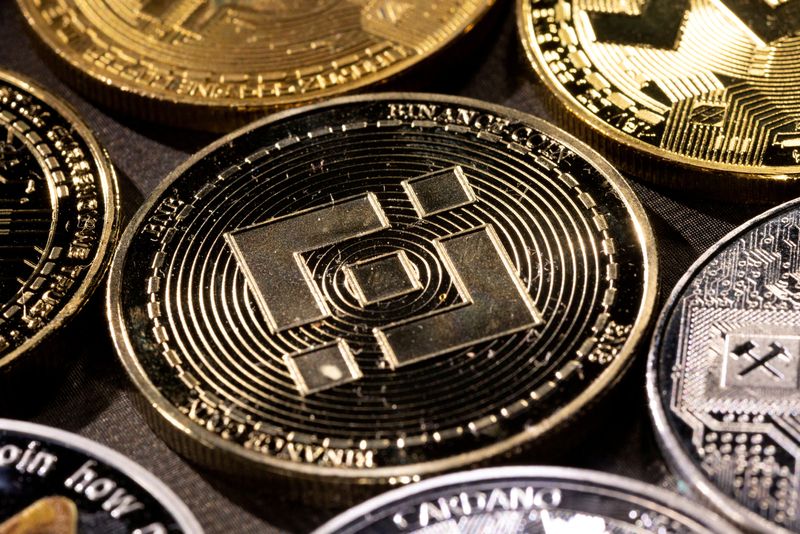NEW YORK (Reuters) - Charges brought by U.S. prosecutors against Sam Bankman-Fried, the founder of cryptocurrency exchange FTX, on Tuesday were among the highest-profile brought against a crypto player. It was the latest in a string of cases involving digital assets that U.S. regulators and prosecutors have been looking into.
Here is a summary of some of those civil and criminal cases, and their outcomes:
BITFINEX HACK
The U.S. Justice Department in February charged a husband-and-wife team on charges of conspiring to launder 119,754 bitcoin stolen after a hacker broke into digital currency exchange Bitfinex in 2016 and initiated more than 2,000 unauthorized transactions. The pair are in talks with prosecutors about a possible plea, court records show.
BITMEX EMPLOYEES
Employees of BitMEX, including the cryptocurrency exchange's founders, pleaded guilty this year to willfully failing to establish, implement and maintain programs to prevent money laundering. The firm's cofounders pleaded guilty in federal court in New York and each agreed to pay a $10 million criminal fine.
Another of the firm's employees also pleaded guilty, and agreed to a $150,000 fine.
Federal prosecutors originally brought the criminal charges in 2020.
In 2021, the exchange agreed to pay a civil penalty to settle separate charges from the U.S. Commodity Futures Trading Commission and the Financial Crimes Enforcement Network (FinCEN) unit of the U.S. Treasury Department.
A BitMEX spokesperson this week declined to comment on the charges against its former employees.
At the time the case was settled with the CFTC and FinCEN, the firm's chief executive officer emphasized its robust compliance and anti-money laundering capabilities.
BLOCKFI LENDING LLC
A subsidiary of crypto firm BlockFi Inc agreed to pay a record $100 million penalty to the SEC and state regulators to settle civil charges in connection with an interest-bearing lending product it offered to nearly 600,000 investors.
BlockFi, which filed for bankruptcy on Nov. 29, still owes $30 million of the $50 million civil penalty it agreed to pay the SEC, according to a court filing.
A spokesperson for the firm did not respond to request for comment this week, but in a statement at the time said the resolution of the case is an example of the firm's "pioneering efforts in securing regulatory clarity for the broader industry and our clients."
FORMER COINBASE MANAGER
The Manhattan U.S. Attorney's Office and the SEC in July charged a former product manager at crypto exchange Coinbase (NASDAQ:COIN), his brother and friend in an alleged insider trading scheme. The cases marked the first-ever insider trading charges involving cryptocurrencies.
The former Coinbase employee pleaded not guilty to the charges. His brother changed an earlier plea to guilty through an agreement with prosecutors. A third defendant has been charged but is still at large.
Coinbase slammed the SEC's charges, saying in a blog post at the time that the exchange does not list securities and that the agency was pursuing "regulation by enforcement."
ONECOIN LTD
In 2019, U.S. authorities charged the alleged leaders of a multibillion-dolar pyramid scheme involving a fraudulent cryptocurrency called OneCoin. One of the leaders is still on the run, and the other pleaded not guilty.
FORMER OPENSEA EMPLOYEE
Federal prosecutors in Manhattan in June charged a former product manager at OpenSea, an online marketplace for non-fungible tokens, with insider trading. The charge marked the first such case involving digital assets.
Prosecutors said the former product manager secretly bought NFTs based on confidential information that the tokens, or others by the same creator, would soon be featured on OpenSea's homepage.
OpenSea this week pointed to its previous statement about the charges that it started an investigation and asked the employee to leave the company.
RIPPLE LABS INC
The SEC in December 2020 sued blockchain payments company Ripple and two executives, alleging they had been conducting a $1.3 billion unregistered securities offering.
The San Francisco-based company, which founded cryptocurrency XRP in 2012, has been embroiled in a years-long court battle with the regulator.
Ripple has asked a judge to deem XRP not a security, and thus not subject to SEC oversight. The case has broad potential legal consequences for the industry, which occupies a regulatory gray area in the United States.
A spokesperson for Ripple did not provide an updated comment this week.
TELEGRAM GROUP

The SEC in October 2019 halted a $1.7 billion unregistered digital token offering by the messaging service Telegram Group and its TON Issuer subsidiary. After a six-month court battle, Telegram agreed to pay an $18.5 million civil penalty and return $1.2 billion to investors.
The firm, which did not admit or deny the SEC's findings, did not respond to request for comment.